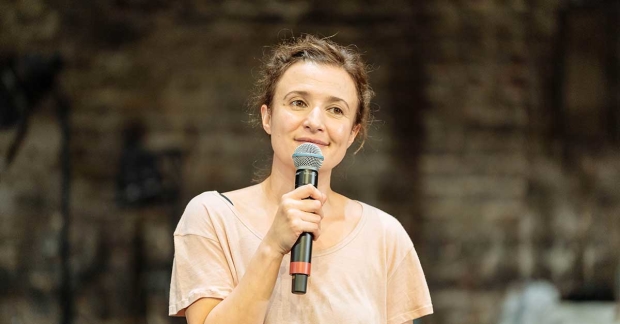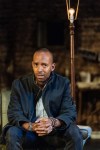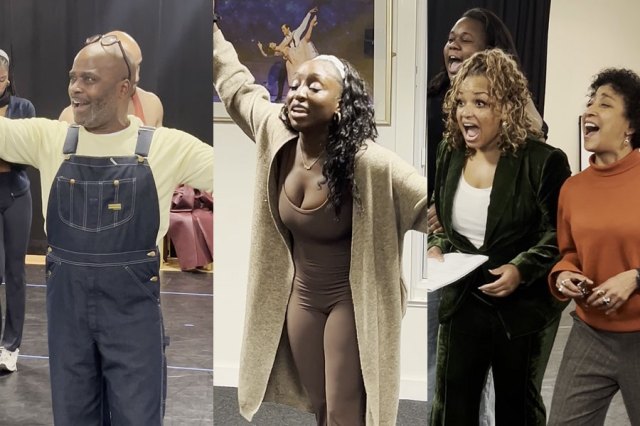Did critics think The Wild Duck was fowl or fair?
Robert Icke’s new show had its opening at the Almeida last night

© Manuel Harlan
Fergus Morgan, WhatsOnStage
★★★★
"Icke's gift is to take a classic text and make it utterly, thrillingly accessible to a present-day audience. He sees straight to the heart of a play and exposes its deep, human truths. With Hamlet, it was the inescapability of grief. With Mary Stuart, it was the ironic duality of fate. Here with The Wild Duck, it's the conflict between fact and fiction."
"It's not entirely perfect – the first half hour is kind of exposition-heavy, and the meta-theatrical conceit with the microphone feels clunky at times – but as Icke's thoroughly thought-through adaptation progresses, as it reaches such exquisite peaks of drama in the phenomenal second half, none of that matters. The final forty minutes is just superb theatre: excruciatingly tense, heart-stoppingly gorgeous (with a wonderful coup de theatre from Christie), and emotionally traumatic, all at the same time."
"But this is Icke's show, through and through. His extraordinary string of critical and commercial hits have already proved that there is no-one else like him working in British theatre today. The Wild Duck simply asserts that further. It's brutal, beautiful, and borderline brilliant."
Natasha Tripney, The Stage
★★★★★
"Icke draws some exceptional performances from his cast. Hogg is a revelation as James – proud, vulnerable, his emotions running close to the surface. Marshal gives the production its solidity. Farrell (a magnificent Claudius opposite Tom Hiddleston's Hamlet) is gruff, kindly, and poignantly lost as Francis.
"The precision of the staging is dazzling. Icke gradually builds the world of the play. The lights, bright at the beginning, slowly dim and the bare stage is subtly populated with furniture – you barely notice it happening. A black cloth masks the top half of the stage, so the Ekdals' attic must be imagined.
"While Icke reuses some familiar techniques, for example a song from the 1960s to underscore a scene of tragedy, and he occasionally overcooks the play's themes, reiterating the idea that everyone has truths they submerge beneath the surface, the production is so assured, so suffused with humanity it doesn't matter."
Andrzej Lukowski, Time Out
★★★★★
"A huge part of Icke's talent is as a writer and being able to adapt stiff-but-important classical texts into empathetic, tender work in modern English. The first half is a frequently beautiful account of flawed human beings trying to keep their sh*t together under desperate circumstances (while also vocally dissecting the allegorical significance of the wild duck Francis has in his attic). It's extremely well anchored by Edward Hogg's weak, caring, bad postured James: a vanity-free performance shockingly different to his matinee idol-ish turn in the Open Air Theatre's As You Like It this summer."
"Without ever quite spelling it out, Icke's Duck also feels like it has something pointed to say about the contemporary outrage culture: Harvey's well-meaning but incredibly damaged Gregory feels like a very *recognisable* figure to anybody who has much time on the internet, a man who believes his take on the truth is so important that he's lost all sense of basic human empathy."
Fiona Mountford, Evening Standard
★★★★
"Robert Icke must rue the fact that theatre awards don't follow the lead of the Oscars and include the category of Best Adapted (Screen)Play. This trailblazing director would have won it several times by now, and he'd win it again this year for his stripped-down, spruced-up take on Ibsen's 1884 classic about the brutality of truth-telling."
"There's particularly lovely work from Marshal; Gina's every emotion registers with a flinch, a shadow across her expressive face. Icke's triumphant march through the theatrical canon continues."
Dominic Maxwell, The Times
★★★★
The second half changes everything. His halfway house between the modern and the Victorian duly established, Icke tightens the noose. He frees Ibsen's remarkable story, lets the plot do its job and soon the emotional costs of living with a lie and with unwanted truths are horribly tangible. Marshal, always a strong presence, is simply extraordinary. The way she fights to keep her family together is hugely powerful and utterly unsentimental."
"So after a clever-clever start Icke's reality games work wonders towards minimising the gap between actor and character, between audience and stage. And by the time Bunny Christie's design goes all the way from bare-brick beginning to leafy, smoky ending the evening completes its exhilarating journey to something resonant, ingenious, involving and moving."
Michael Billington, The Guardian
★★
"This is still bastardised Ibsen that omits the most crucial weapon in his dramatic armoury: irony. There are few greater scenes in world drama than the climax, where Ekdal, claiming that he can no longer live in a house tainted by lies, first tries to piece together a torn-up letter securing Hedwig's future and then sits down to breakfast.
"Typically, that scene goes for little in a production that seems oblivious to Ibsen's comedy. Icke knows how to stage a play and, with the aid of Bunny Christie's design, pulls off a visual coup with the revelation of the fake forest where Clara Read's Hedwig keeps her wild duck and Nicholas Farrell as Ekdal's father goes hunting.
"But Ibsen was a better dramatist than Icke and, since we see this play so rarely, I feel audiences deserve the real thing rather than this parasitic rewrite."




















